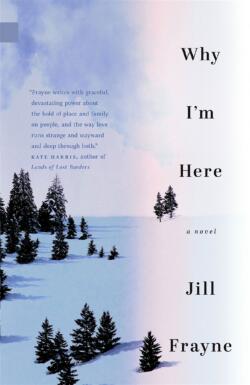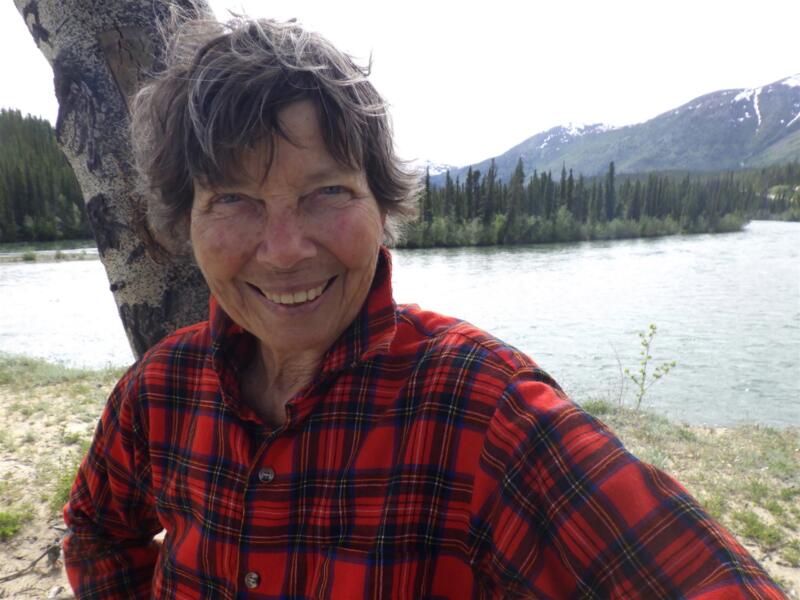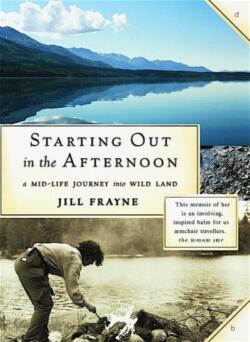Val's Book Reviews

Why I’m Here: A Novel
by Jill Frayne
Edmonton: NeWest Press, 2022
$21.95 / 9781774390498
Jill Frayne’s book Why I’m Here is a combination of the strong pull of family, overwhelming heartache and puzzling mystery. The book is a compelling read set against the fierce splendour of the Yukon.
The protagonist, Helen Cotillard, is a disillusioned counsellor in the only available agency for youth and families in Whitehorse. Her first meeting with fifteen-year-old Gale makes her convinced that the girl desperately wants to leave the Yukon and return to her mother Mindy, step-father Neil and little step-sister, Buddie. This is confusing because Mindy is an abusive alcoholic and has been in and out of prison many times. But Gale misses her sister and fears for her safety. She resents the fact that she was sent to Whitehorse to live with her father, Dave, and step-mother Sandy

In many ways, Helen soon realizes that Gale’s story parallels her own and as the story progresses, the reader learns that Helen’s own sister (Jo) tragically died on one of her visits to Whitehorse to stay with Helen. Helen blames herself for what happened to her sister — and therein lies another mystery. What happened to Jo was indeed a tragic accident, but Helen is so consumed by blame for the past, that her job as a counsellor is suffering and she fears she is unable to help Gale or any of her other clients, including a troubled boy named Keith Balboa.
Frayne’s story jumps back and forth from Helen’s present situation to her past life with her family and sister, Jo. She wishes she had never left her much younger sister behind in order to work in the Yukon. Their infrequent visits together were never enough and now it is too late. In that respect she has begun to think of her client, Gale, in a sisterly way and desperately wants to save her.

All of Frayne’s characters are compelling, even Helen’s beloved dog, Chief Joseph, who accompanies her on her walks and understands her fluctuating moods. Gale herself comes across as a disturbed youngster who is reluctant to open up to Helen and only begins therapy with her at the insistence of her stepmother, Sandy, who is worried about Gale’s frequent anxiety attacks. But Sandy herself has trauma from her past so is not very good at helping or understanding her stepdaughter. Gale’s father, Dave, is opposed to becoming involved in his daughter’s problems because he sees similarities in Gale to his ex-wife, Mindy, and he wants no part of that toxic scenario again. A brief glimpse into Mindy’s earlier life, however, offers some compassion for Mindy, enabling the reader to see why she has become the abusive woman she is today.
Keith Balboa, the young boy who is another reluctant client of Helen’s, is also a strong character. He appears to be yet another lost soul in the wasteland of the north. This makes for a somewhat depressing picture of the future for young people growing up there and all of this hangs heavily on Helen and other counsellors in Whitehorse.
These stories are all set against the powerful landscape of the Yukon and here is where Frayne’s book really shines. Passages such as:
The Yukon was sere, a silver cast to the land at any season. Sky and rock, no earth.
And:
That part of the Territory always gets a heat wave in early spring. A hot wind whooshes over the mountains, brown melt-water rushes in the roads, and Yukoners, after a seven-month winter, walk around with their coats open, dazed as houseflies waking up in a hot room.
And:
Fall in the Yukon lasts three days. It is the barest threshold before the winter storms roll in. Over three days summer throws a last fond look over her shoulder, sets the land aglow. And then vanishes. Taking the light with her … autumn in the Yukon is rose, a thousand shades of rose. It is fireweed and highbush cranberry and wild strawberry. For three days.
There are equally descriptive passages of life in Cobalt, Ontario, where Gale’s mother, stepfather and little sister live and where Gale longs to be.

When Gale eventually does run away, despite the fact that she and Helen were beginning to connect through more meetings, Helen feels she has failed her and begins to question everything about her life choices.
The rather abrupt conclusion to Why I’m Here left me wanting to know more but maybe that was Frayne’s intention, forcing her readers to come to their own conclusions. As a reviewer of this compelling book, my own takeaway to the story was that perhaps the heart really does know best about the place where one should be.
This is a story about the powerful hold both place and family have on us and the fact that love cannot be rebuffed even when it is ugly.
Jill Frayne herself worked as a family counsellor in Toronto and central Ontario. After visiting the Yukon she wrote a travel memoir, Starting Out in the Afternoon, and many outdoor adventures articles for various Canadian publications. Why I’m Here is her first novel. Today she spends time in central Ontario and the mountains around Atlin, BC.
Link to Original Review
“The Ormsby Review, named for pioneering historian and UBC professor Margaret Ormsby, is a remarkable and comprehensive online review of more British Columbia books than you ever imagined existing — the west coast publishing market is lively. It covers fiction, poetry, politics, memoir and much else, as well as a lot of local and west coast history.” – Christopher Moore, September 14, 2020.
Editor and Publisher: Richard Mackie
Mission Statement: The British Columbia Review, formerly The Ormsby Review, is a lively and inclusive Vancouver-based online journal devoted to the literature, arts, culture, and society of British Columbia. Our mandate is to review books by BC-based writers wherever they choose to publish them. We review books from the member publishers of the ABPBC (Association of Book Publishers of BC), but we also review books that are privately printed, self-published, or published by BC writers at publishing houses elsewhere in Canada or abroad. When possible, we also find BC reviewers. Our accessible and authoritative reviews and essays, written by experts in their fields, are packaged as illustrated magazine articles.
The British Columbia Review works with writers, publishers, and literary professionals across Canada to promote books published by BC writers or about British Columbia in all its diversity. We include books by all authors, regardless of race, age, ability, sexual orientation, gender or gender identity, ethnicity, religion, political belief, marital or family status, and/or status as Indigenous, Métis, or Inuit.
The editorial offices of The British Columbia Review are located near Commercial Drive in East Vancouver, in the traditional, unceded, and sometimes overlapping territories of the Musqueam, Squamish, and Tsleil-Wauuth peoples. Indigenous British Columbia, the land on which we live and create, extends over a large area comprising three culture areas, eight language families, and 32 distinct languages. We endeavour to review all books by and about Indigenous BC. Those reviews can be accessed directly here.
